Hagens Berman attorneys filed a consumer-rights class-action lawsuit against Procter & Gamble, makers of Charmin toilet paper, for allegedly failing to uphold the eco-friendly promises on its packaging. The lawsuit accuses the company of having been complicit in the clearcutting of untouched ancient primary forests in order to sell billions of dollars of single-use toilet paper.
Evidence shows that Procter & Gamble has paved a path of disinformation, allegedly using hazy loopholes and brazen untruths to prey on consumers desiring to choose a more environmentally friendly bath tissue.
Hagens Berman’s legal team has taken on major corporations for environmental degradation, from Exxon Mobile to Rio Tinto. We’re here to set the record straight and go toe-to-toe with P&G’s myths about Charmin toilet paper’s environmental impact. We’re going head-to-head with Charmin’s greenwashing campaign to expose the truth about its logo usage, environmental protection statements and the negative impacts of the company’s true manufacturing practices.
If you would like to stay updated about this case, fill out the form »
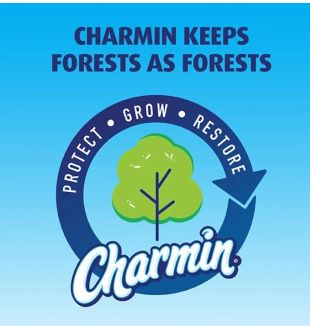
Charmin’s “Keep Forests as Forests” campaign makes three promises to consumers via its “Protect-Grow-Restore” logo. For its “Protect” promise, Charmin claims to only use pulp certified by the Forest Stewardship Council or “FSC”. The Forest Stewardship Council (“FSC”) is an international non-profit that promotes responsible management by offering a forest certification system for forests and forest products. For its “Grow” promise, Charmin promises that “for every tree used at least two are regrown in its place” and suggests that the Company is helping to replace the forest it uses via thoughtful and effective replanting efforts. For its “Restore” promise, Charmin touts its partnership with the Arbor Day Foundation to plant 1 million trees in forests affected by natural disasters.
P&G’s CLAIM #1: Procter & Gamble claims that it “PROTECTS” trees because its Charmin toilet paper is sourced from Forest Stewardship Countil (“FSC”) certified forests.
FACT: P&G does not disclose that only a small fraction of wood pulp sourced for Charmin comes from FSC-certified forests. Instead, Charmin relies on suppliers who harvest using industry logging practices such as clear cutting and burning of Canada’s boreal forest — an ecological jewel and one of the last intact forests left in the world.

Boreal forests circle the Northern Hemisphere with some of the world’s remaining untouched wilderness. They are crucial for our planet’s health, and according to the National Resources Defense Council in Canada, “store 30 to 40 percent of earth’s land-based carbon, making the boreal critical to the fight against climate change.”
P&G’s CLAIM #2: Procter & Gamble claims it “GROWS” and “RESTORES” trees because it plants one to two trees for every one cut down, while showing images of lush, dense, old-growth forests, because it wants to “Keep Forests as Forests”.
FACT: Charmin suppliers are converting lush, dense, old-growth forests into monoculture tree crops or “plantations.” P&G’s suppliers also spray chemical herbicides like Aerial Glyphosate Spray (a key ingredient in Monsanto’s Roundup product) to intentionally eliminate all growth other than just a handful of tree species most valuable for logging. These Frankenforests degrade overall forest health, reduce biodiversity and alter the boreal forest’s unique structure. Moreover these Frankenforests have exponentially less carbon storage capability.
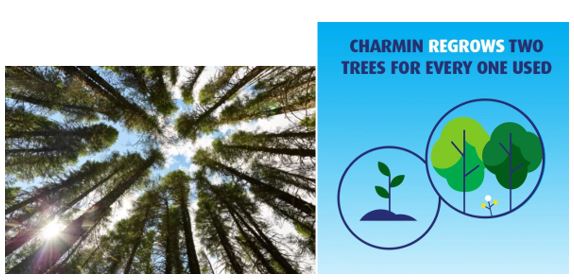
P&G’s CLAIM #3: Procter & Gamble claims that 100% of its wood pulp is FSC-certified.
FACT: Charmin plays fast and loose with the various FSC logos to cloak the fact that only a small fraction of its wood pulp is sourced from FSC-certified forests (“FSC 100%”) and that P&G has actually watered down its FSC certifications to the “FSC Mix” level. P&G also fails to tell consumers that it has begun to rely on certifications from the Sustainable Forestry Initiative (SFI) and the Programme for the Endorsement of Forest Certification (PEFC). But both entities have been criticized by environmental action groups like Greenpeace as being weak and ineffective at enforcing responsible forest management practices.
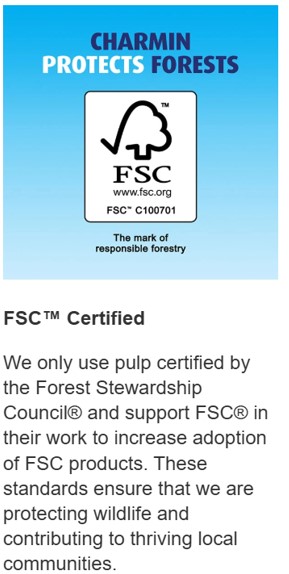
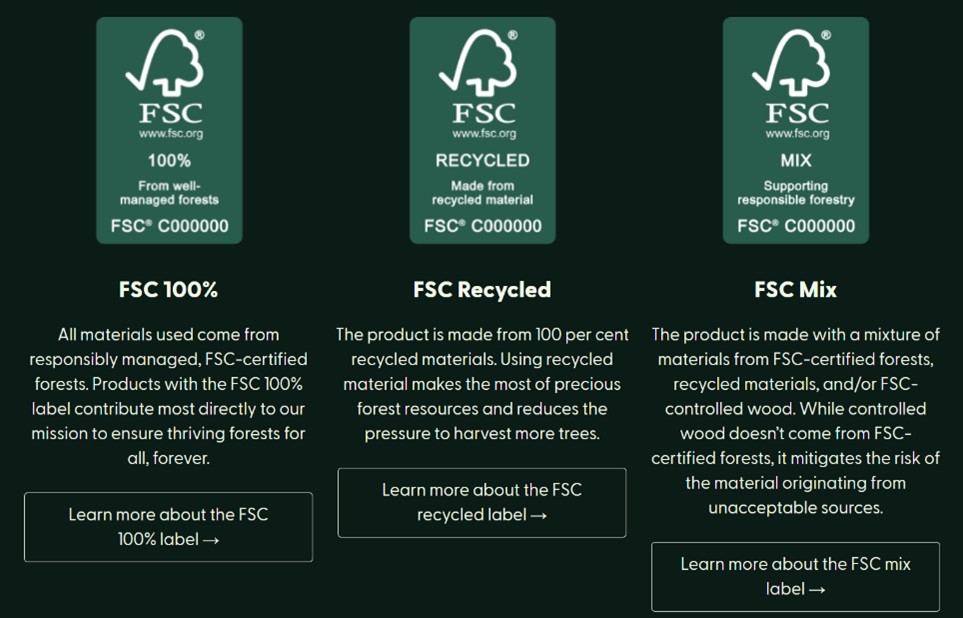
P&G’s CLAIM #4: P&G claims its Charmin bath tissue is Rainforest Alliance Certified, meaning its product manufacturing is environmentally conscious.
FACT: Charmin packaging features the Rainforest Alliance’s Forest Allies seal, which is crucially different from its well-known “Certified” seal.
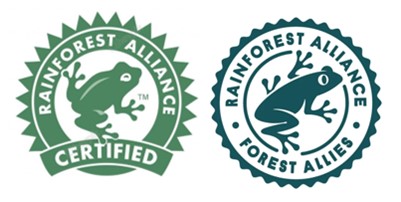
The FAO’s definition of deforestation is as follows, “Deforestation implies the long-term or permanent loss of forest cover and implies transformation into another land use. … The term specifically excludes areas where the trees have been removed as a result of harvesting or logging, and where the forest is expected to regenerate naturally ….” Procter & Gamble’s 2023 Forest Commodities Policy says the company is committed to no deforestation, citing the FAO definition.
In 2016, Procter & Gamble began sourcing pulp from Forest Stewardship forests, according to its claims to consumers, certified by the Rainforest Alliance, a non-profit organization that works to protect the environment, and started featuring the well-known Rainforest Alliance Certified seal on the packaging of its paper products, appearing first on Charmin toilet paper. This seal signaled to consumers that Procter & Gamble was making an environmentally friendly effort to produce its products.
However, in the past few years, the Rainforest Alliance transitioned its sustainable forestry certification business to another non-profit organization. Therefore Procter & Gamble could no longer feature the Rainforest Alliance Certified seal. Realizing the importance that this seal had for consumers, especially those focused on eco-friendly products, Procter & Gamble allegedly made a coordinated effort to deceive consumers by commissioning a lookalike seal. But the lookalike “Forest Allies” seal refers to no actual certification process, and has no operations in the boreal forest, but is instead a community of practice that supports forest communities located in the tropics.
P&G funded a new program in 2021 named Forest Allies under the Rainforest Alliance brand, allowing it to print the nearly copycat seal on its products for three years. The deal cost P&G $250,000 per year. The difference behind the two seals were never made clear to consumers, and Charmin continued producing its packaging — and allegedly participating in environmentally damaging actions — without the public’s knowledge. Charmin also features the obsolete “Raniforest Alliance Certified” seal on its “Charmin Sustainability Promise” website.
Hagens Berman attorneys seek to hold the company accountable for its alleged behavior. If you are interested in staying up to date with this case, please fill out our form »





